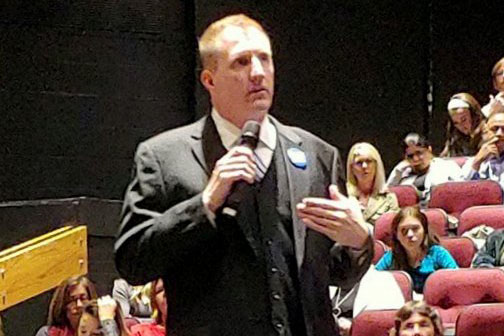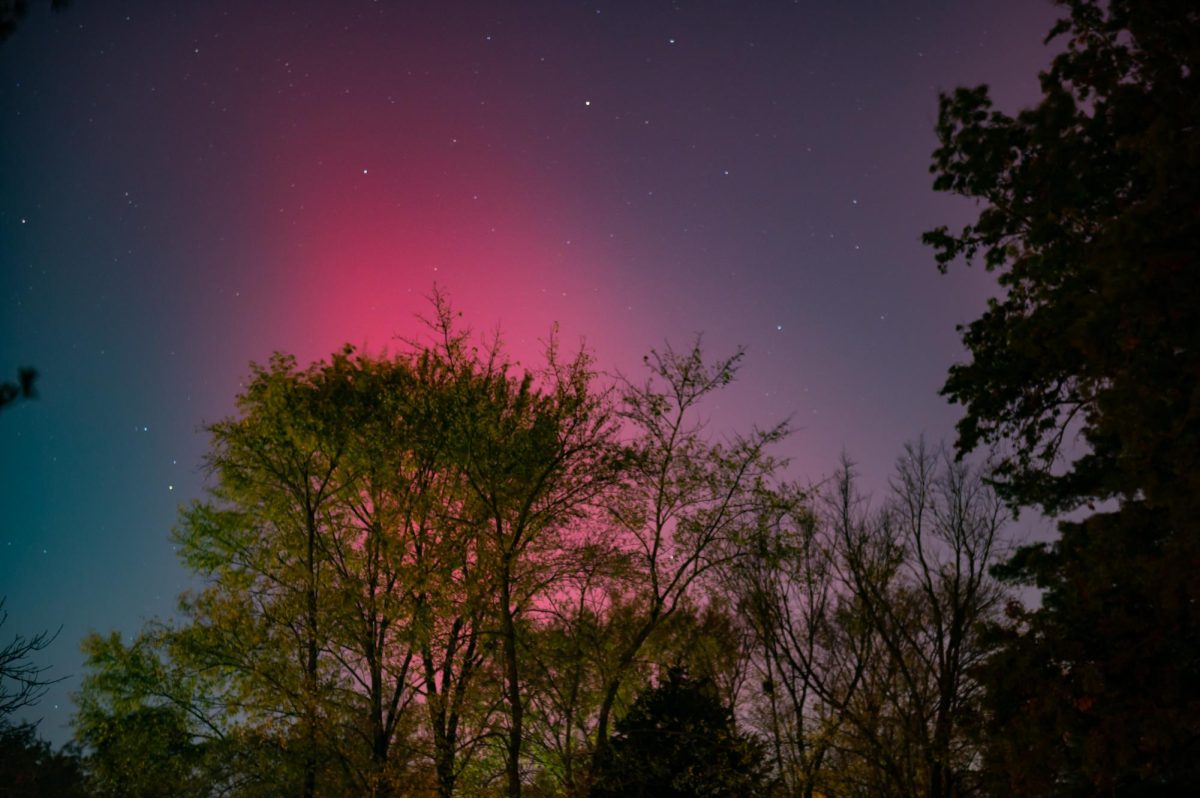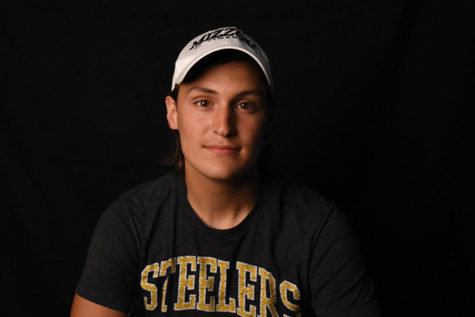
Since 1948, no declared presidential candidate from a third party has received a single electoral vote in the electoral college.
At the Parkway School District Student-Sponsored Candidate Forum, Libertarian Candidate Larry Kirk sat alongside Democratic Candidate Cort VanOstran, stating his opinions and sharing his personal platform, something that has not happened on the presidential debate stage for 26 years.
“The two major parties today would like you to believe that we have a two-party system,” Kirk said. “But not everybody’s ideology lines up with either of the two major ones 100 percent. It’s important for people to recognize that they don’t just have to pick one or the other. There is almost certainly a party out there that better represents your views.”
In the 2016 election, the Libertarian Party had ballot access (meaning the candidate from that party was listed on the election ballot) in all 50 states and Washington D.C., becoming the first third-party to have ballot access in all 50 states and Washington D.C. for the first time since 2000. The Green Party, however, which was the fourth leading party in terms of popular vote in 2016, was only listed on the ballot in 44 states.
“It would be great if parties had ballot access in all 50 states,” junior Katie Solodar said. “But it would still be hard for third parties to break through because everyone thinks we have a two-party system, which is unfortunate.”
In England, due to their “first past the post” voting system, in which their parliamentary candidate is selected strictly by a popular vote and not a winner-take-all electoral system like in the United States, it becomes easier for third parties to gain representation on a national stage.
“I think a first past the post system would help third parties a lot,” junior Jason Reilly said. “Right now I think people figure that a third party vote is a waste of a vote and I think a first past the post system would help create more competitive elections.”
In local elections, however, third parties are more common. After the 2017 election, the Libertarian and Green Party combined held a total of six state congressional seats as well as 330 other locally elected positions.
“I think it’s encouraging to see third parties being represented in local elections because it shows that the two-party system can be overcome,” senior Noah Gwin said. “I’m more conservative myself but I like seeing more than just the two major parties represented in government. Hopefully, we can see more in 2019.”
As for Missouri’s second district, FiveThirtyEight puts the chances of a third party victory at one in 100. But Kirk remains hopeful that awareness for third parties will grow in the coming years.
“I believe that the post-Millennials (those born after 2000) and the generation after will lead the way for third parties,” Kirk said. “It is up to [students] to lead the charge and raise awareness for third parties in your generation.”


![Gazing up from the stage, junior Joseph McCurdy who played Peter Pan in the school play, Lost Girl, sits next to senior Juliana Rogers, who plays Wendy Darling, during a theater rehearsal. McCurdy’s passion for theater began when he observed a West High production in middle school. “I've been in the high school theater program since I was a freshman. I've always loved theater, but [what prompted me to join] was [when] I went to see [a performance here] when I was in middle school, and it was super cool,” McCurdy said.](https://pwestpathfinder.com/wp-content/uploads/2025/11/IMG_6535-1200x798.jpeg)

![Standing tall, stacked in a precise formation, the cheer team strikes a signature pose during halftime on Sept. 12 at the varsity football game. Nearly a month after this performance, the cheer team performed at the Missouri Cheerleading Coaches Association (MCCA) regional competition on Oct. 4, 2025. “We've all come [to] work together a lot more,” sophomore Elyssa Philippi said. “We're a lot closer than we were [earlier in the season] and going to state has made us closer [in] trying to work with each other, learn [new] skills and make our team better.”](https://pwestpathfinder.com/wp-content/uploads/2025/11/DSC5139-1.jpg)
![Handing out candy to excited trunk-or-treaters, President of the United Nations Children’s Fund club and junior Sara Ashok represents that group. Ashok was eager to participate in this event for multiple reasons. “I really wanted to be a part of the event because I get to help create memories for kids and spend time with my friends, spreading the things [I'm passionate about],” Ashok said.](https://pwestpathfinder.com/wp-content/uploads/2025/11/DSC_8648-1-1200x800.jpg)

![Smiling in a sea of Longhorns, Fox 2 reporter Ty Hawkins joins junior Darren Young during the morning Oct. 3 pep rally. The last time West was featured in this segment was 2011. “[I hope people see this and think] if you come to [Parkway] West, you will have the time of your life because there are so many fun activities to do that make it feel like you belong here. I was surprised so many people attended, but it was a lot of fun,” Young said.](https://pwestpathfinder.com/wp-content/uploads/2025/10/Edited2-1200x798.jpg)
![West High seniors and families listen as a representative of The Scholarship Foundation of St. Louis, Teresa Steinkamp, leads a Free Application for Federal Student Aid (FAFSA) workshop. This session, held in the library, provided guidance on financial aid, scholarships and student loan options. “This event is very beneficial for any seniors who are applying to or considering applying to colleges after high school [because] the cost of college is on the rise for seniors and parents,” college and career counselor Chris Lorenz said.](https://pwestpathfinder.com/wp-content/uploads/2025/09/DSC_4478-1200x778.jpg)
![Senior Kamori Berry walks across the field during halftime at the Homecoming football game on Sept. 12. During the pep assembly earlier that day, she was pronounced Homecoming Queen. “I thought it was nice that the crowd [started] cheering right away. I know [my friends] were really excited for me, and my family was happy because typically non-white people don't win,” Berry said.](https://pwestpathfinder.com/wp-content/uploads/2025/09/DSC7046-Enhanced-NR-1200x798.jpg)


